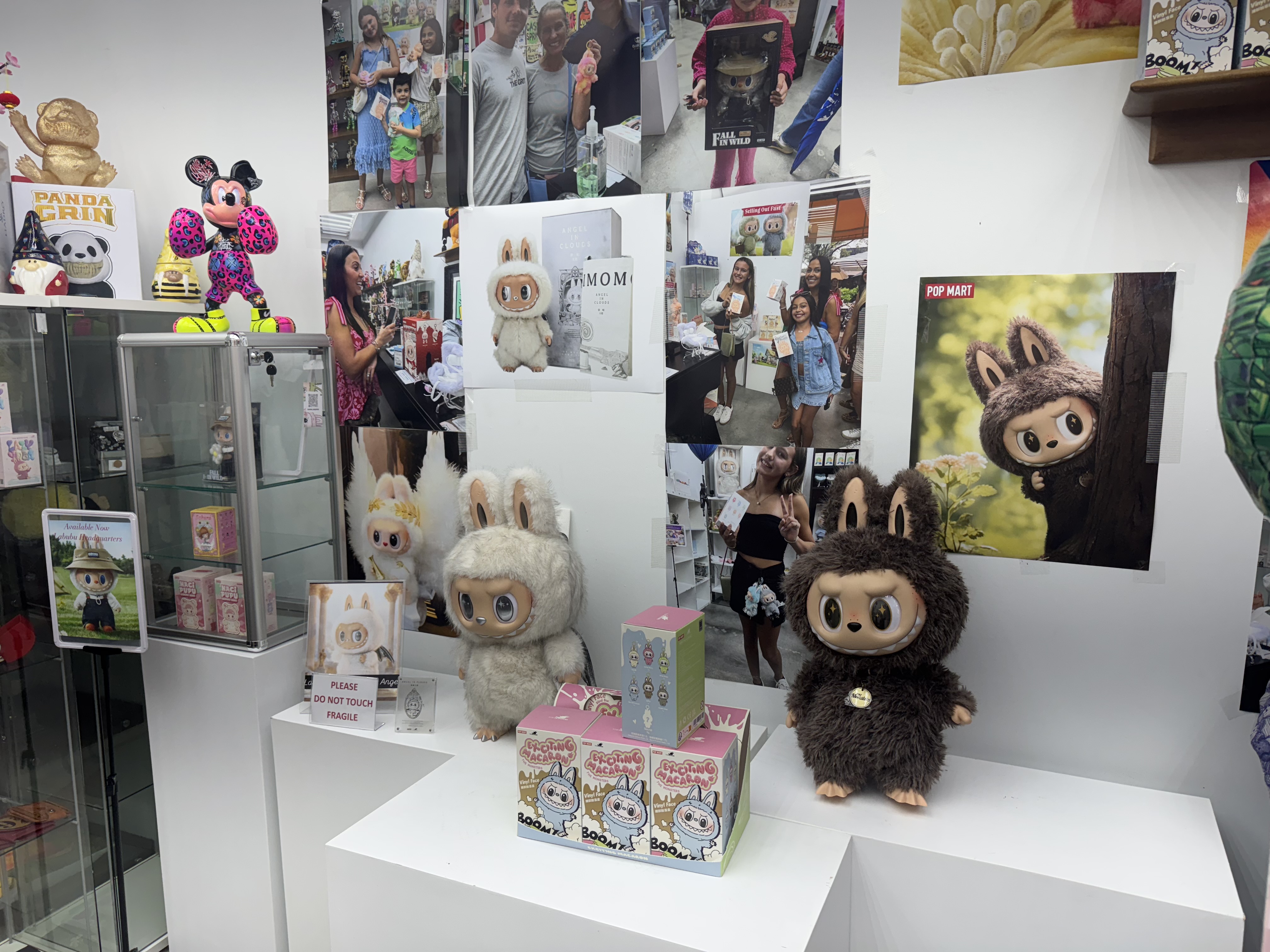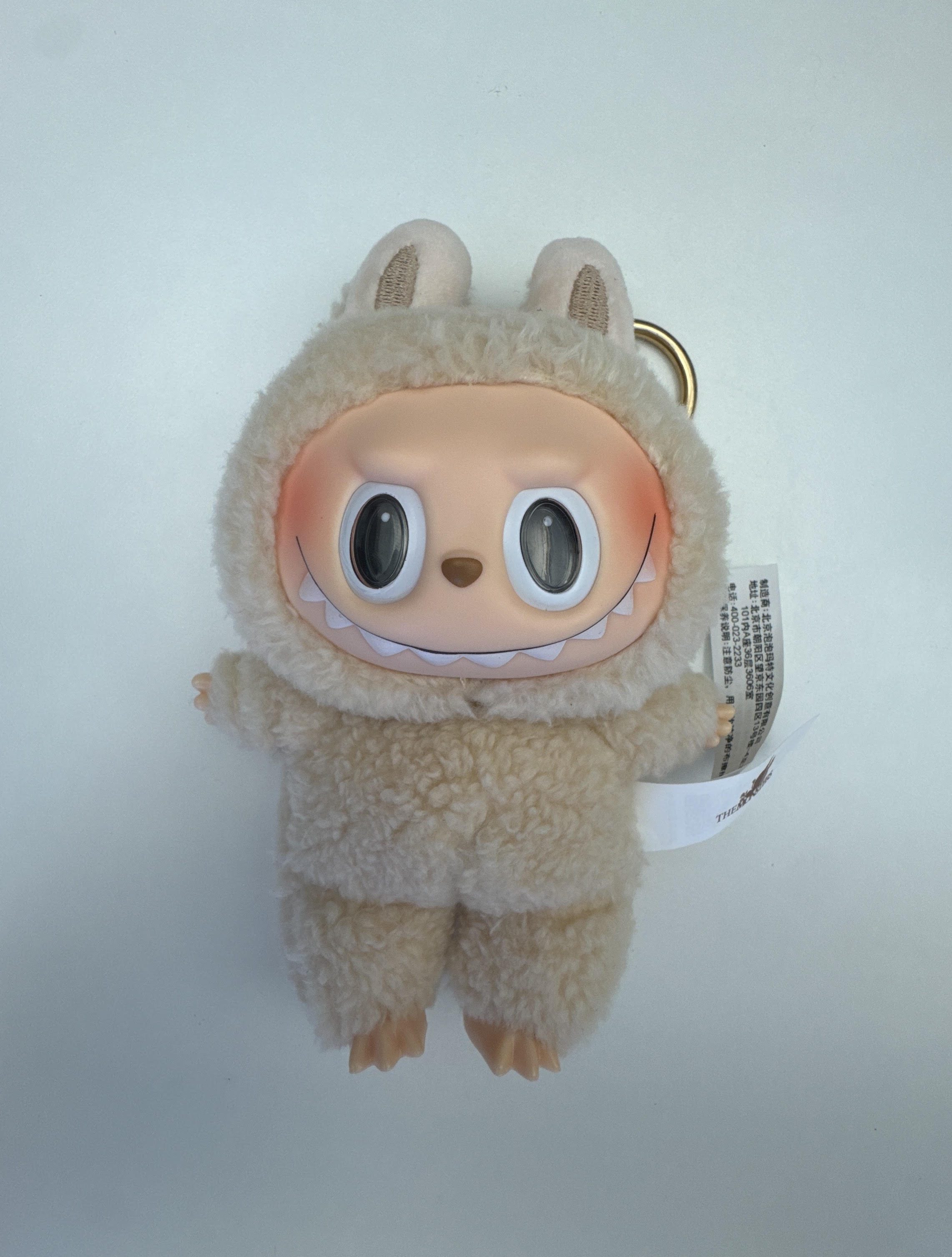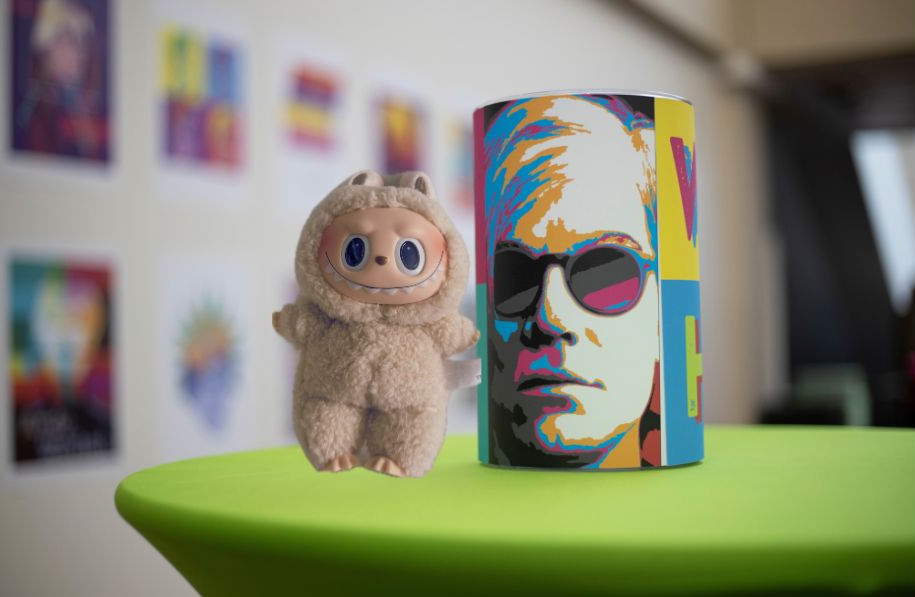It appears that indicted art fraudster Leslie Roberts, who is accused of selling millions of dollars’ worth of forged Andy Warhol artwork, has found his new hustle: selling Labubus. His second store, located just a few hundred feet away from his former art gallery in Coconut Grove, initially operated as the Miami Fine Art Gallery Gift Shop. Then, it became Shirt, Boots, Hats. Now, the shop has transformed into Labubu Headquarters.
According to the Florida Department of State’s Division of Corporations, Labubu Headquarters is registered with the state as of August, with Roberts as the registered agent. His new wife, Kathryn Domingues, is also listed on the corporate documents. Labubu dolls, Labubu-inspired keychains, and posters have since replaced the art coffee table books, playful donut paintings, pop wall art, and Kaws statues that were once on display. The store, which has hosted several so-called Labubu parties, boasts a collection of limited-edition Labubus and the popular Monsters blind box series, along with an assortment of accessories.
“Labubu-headquarters – your official Labubu store, the store’s Instagram bio reads. “Rare treasures for collectors, pure joy for kids. Join the family & collect the magic.” The page features videos of teenagers unboxing the cute-but-terrifying specimens, and other curiosities (Labubu extensions, anyone?).
Given the rise of counterfeit Labubus, better known as “Lafufus”, and Roberts’ shady past, New Times wanted to ensure that whatever he was selling was, in fact, the real deal.
The Acquisition
So, one Monday afternoon, a New Times journalist wandered into Labubu Headquarters to inquire. Inside the Labubu paradise, the store employee assured her that the dolls were authentic. The popular “Monsters Macaron Vinyl Face Blind Box” had a hefty price tag: $95. The Chinese retailer Pop Mart, which produces the viral dolls, sells the same box for $28.
Following extensive newsroom discussions (How much did we want to drop on a doll that would haunt our dreams? Would corporate sign off on this very serious expenditure? Was there a cost-benefit analysis form for a plush doll with sharp teeth?), New Times bit the bullet and dropped $101 on the toy. As a small token, the store employee also handed over a Labubu-inspired keychain.
 Leslie Roberts, the one-time owner of Miami Fine Art Gallery, is now selling Labubus at his store in Coconut Grove.
Leslie Roberts, the one-time owner of Miami Fine Art Gallery, is now selling Labubus at his store in Coconut Grove.
The Investigation
The deep-dive investigation, rivaling the Watergate scandal, had begun. After returning to the newsroom, the entire editorial team piled into the conference room to see what the blind box would reveal. Thanks to our handy guide on how to spot a Lafufu, we knew exactly what to do.
Before opening the box, we scanned the QR code to see if it would direct us to the official Pop Mart verification page, allowing us to utilize the “anti-counterfeiting verification” feature. We received a confirmation message stating it was an authentic Pop Mart product. However, our investigation was far from over — some Lafufu sellers had tricked buyers by placing QR codes on their boxes that scanned to the official Pop Mart site.
Next, we opened the blind box to unveil a (drumroll, please) Soymilk Labubu, the doll with the beige fur, if you are not familiar. The neutral office girlies nodded in approval.
 The Labubu in question
The Labubu in question
It was then time to examine the doll’s features. High-quality packaging: check. Nine teeth: check. Clean stitching: check. The bag inside the box looked a bit shiny, a slight red flag. As we tossed the doll around the room to one another for individual inspection (with utmost care and in the absence of food and coffee), we all agreed the doll’s paint job wasn’t very clean; the blush on its cheeks bled into its smile, turning some of the teeth a faint shade of pink. The blush itself seemed too pink and not blended very well. All bad signs. Unfortunately, no one had a UV light handy to see if the doll’s right foot had a mini Labubu on it.
After inspecting the doll, we scanned the QR code on its tag. Sure enough, we received another message confirming it was genuine. But our investigation didn’t end there. We thought, “Maybe the tricksters got more advanced and were able to use fake QR codes on the dolls?”
The Conversation
We decided to speak to a “Labubu Expert,” who said she had a great eye for spotting a Lafufu. We hopped on FaceTime with her and allowed her to inspect the doll. She immediately agreed that something about the doll’s face and teeth seemed wrong.
“It looks like shit,” the expert said.
Still, the QR code confirmation stumped her.
New Times emailed Pop Mart for help and asked if Labubu Headquarters is affiliated with the retailer, but we got no response.
Exhausted and still lacking a definitive answer, we turned to the r/Labubu subreddit to ask if our Soymilk doll resembled a Lafufu. We attached a photo of the doll’s legs, feet, bag, and a close-up of its face. We also mentioned that the QR codes confirmed the doll’s authenticity.
“The foil bag should have four holes, not one, and I think the nose is the wrong color,” one Reddit user commented. “I think it’s supposed to be more of a gold. ETA is there a QR code tag for you to scan? That’ll be a dead giveaway. But also, I just noticed that the mouth isn’t quite right, either. I think it’s a fufu. I’m so sorry.”
Another added, “My soymilk’s nose is several shades lighter than that 😡 where did you get this? Maybe they’ve finally learned to game their way around QRs on the tags…”
New Times emailed Roberts’ attorney, asking if he is authorized to use the name “Labubu Headquarters” and if he is permitted to sell the dolls, despite his strict bond conditions, which prohibit him from being involved in the art industry. We have not heard back at the time of this reporting.
Alas, whether the little monster we acquired is a Labubu or Lafufu has yet to be ascertained. But Roberts’ 15 minutes of fame, from allegedly selling forged Andy Warhol artwork to peddling elfish dolls to preteens, is getting stranger by the minute.

